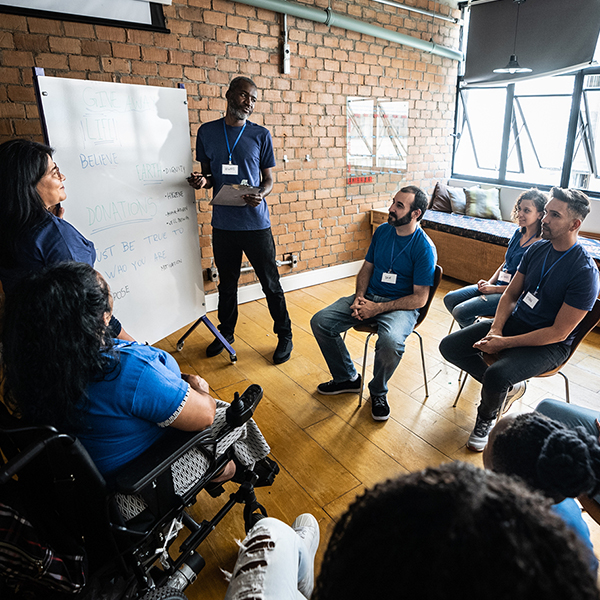In March, the home stretch of her BCom degree, Yuliya Novosad anticipated a job offer from an I.T. company.
But in the blink of an eye, the world changed dramatically with the Covid19 pandemic and she never heard back.
Despite the setback, Novosad, who majored in international management, sounds upbeat and has come up with a new game plan. She plans to acquire additional skills and to reach out to employers to make connections – more for informational-type interviews.
“I hope that students in the same situation as me just don’t give up. Don’t feel too down because everyone is in this. Using this time as an opportunity to upskill is probably the best thing you can do with your time.”
Helping grads navigate economic uncertainty
Spare a thought for the Class of 2020 at McGill, which in addition to not having a convocation ceremony on campus this year, had the rug pulled out from under it on the cusp of graduation.
They’re venturing into a job market with freakish storm clouds overhead.
“They’re facing a job market that was very strong just a few months ago, and now it has gone to unsure or weak or non-existent in some areas,” says Darlene Hnatchuk, Director of McGill’s Career Planning Service (CaPS).
“In some areas it is still relatively strong,” she adds, but businesses don’t yet know at what rate their operations will pick up. “We need to work with our students and graduates to help them face that uncertainty. How do you manage that ambiguity?”
CaPS launched a Job Search Resiliency Discussion group to support grads as they pivot to a new reality.
It also changed how it provides workshops – they’re online, shorter and packaged together.
“Students can pick and choose,” Hnatchuk says of the Online Job Search Bootcamp. “We’re giving them more frequently. And we’ll continue to do that over the summer,” which they rarely do, she adds. They have more than 60 students in every workshop, “so the interest is there.”
New grads can practice their online interviewing skills through a platform they can access on CaPS’ website.
“In a way, we have been preparing to have different online opportunities and services for students that they haven’t necessarily been taking advantage of before,” Hnatchuk says. “They didn’t need to – now they [do].”
The new graduates can also sift through more than 800 job postings from around the world on McGill’s student employment portal myFuture, and even search for “remote work” opportunities.
CaPS continues to connect with employers to understand current and anticipated recruitment needs, Hnatchuk says, and plans to stage more virtual recruitment events.
McGill alumni can help. If your company is recruiting, McGill’s Career Planning Service welcomes a heads-up. McGill has talented, hard-working graduates who recently proved with the University’s shift to online learning that they’re able to adapt quickly, Hnatchuk says. “And that’s what you need in the world of business or any organization. Everyone is turning on a dime.”
Phone calls to every BCom graduating student
The Soutar Career Centre team in McGill’s Desautels Faculty of Management has started calling every Class of 2020 graduate to check in and let them know about the remote career support available.
For those who had landed full-time jobs prior to graduation, most offers are being honoured, says Marie-José Beaudin, the centre’s executive director.
The centre wants to ensure jobseekers have a resilient mindset. This period will pass, notes Beaudin. “How do you position yourselves forward?”
Beyond a weekly e-newsletter that includes job postings, the Soutar Career Centre is organizing a slew of online workshops, on topics ranging from interviewing remotely to tech savviness. A resume booklet showcasing graduates who are looking for work will be shared with employer partners in the near future.
“We’re extremely proactive in making sure the students are aware of all the resources available to them and what sectors are actively recruiting”, Beaudin says.
Most students in McGill’s Faculty of Law nail down their articling positions long before graduation.
Only one or two articling offers have been rescinded to their knowledge, says Sophie Roy-Lafleur, director of the Faculty’s Career Development Office.
“I think we’ll know more later in the summer in terms of the impact,” says Roy-Lafleur who notes that law grads take their bar exams (and attend bar school for four months if they’re staying in Quebec) before articling.
The career office recently held its annual session on professionalism to prepare students and graduates for their summer jobs and articling positions, respectively. “What we’ve added this year is how to prepare for remote work,” says Roy-Lafleur, and how they can succeed in those positions working that way.
Most articling graduates are returning to employers that they’ve worked for before “so that helps”, she says, of the remote work context.
At the Engineering Career Centre in McGill’s Faculty of Engineering, “we are offering as many of our services as we can remotely,” says Rachel Schafts, industry liaison associate. That includes staging mock interviews, reviewing CVs and one-on-one career advising.
The Faculty’s Class of 2020 has already had access to internships as well as two career fairs (“TechFair”) on campus earlier this academic year.
The centre is looking at organizing info sessions online with employers. It is reaching out to companies to determine their needs and how it can connect students with them. The centre also intends to survey students about their new needs “because it’s not the same reality,” Schafts says.
McGill University Advancement, which includes alumni and donor relations, has also stepped up to support the Class of 2020.
It reached out to the Class of 2008, which knows a thing or two about breaking into a difficult job market.
McGill alumni who graduated during the recession of 2008 are asked to send either a text or video message of encouragement to the Class of 2020 as they seek job opportunities.
Alumni relations is also organizing a series of webinars titled “Life, Interrupted” to help young alumni and graduating students. The latest session, hosted by the McGill Young Alumni Board on May 12, explored the “new normal” of career planning and recruitment.
Will your organization be hiring this summer or fall for full-time, part-time, summer or internships? Are you in a position to influence where your organization recruits? As a McGill graduate, you know what our diverse, talented, and hard-working students and recent alumni can offer. CaPS, McGill’s central career services, has put together some resources, including new funding opportunities, to support student/new graduate recruitment. Please contact CaPS to discuss your recruitment needs.


